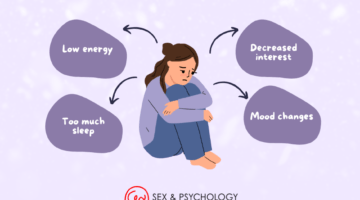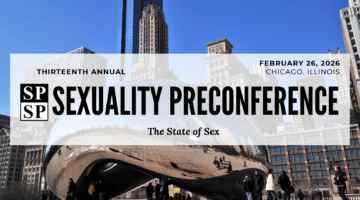Have Some Human Sexuality Courses Crossed The Line?
July 9, 2012 by Justin Lehmiller
There has been a lot of controversy over college-level Human Sexuality courses lately. For instance, a student at Western Nevada College just filed a lawsuit against her school and instructor because she attended a Human Sexuality course in which students were allegedly required to masturbate, keep a sex journal, and discuss their own sexual history as part of a paper assignment. And last year, a well-known sex researcher made headlines after it was discovered that he held an event for his Human Sexuality students outside of class in which a nude woman was sexually stimulated by a motorized sex toy on stage. These are just a few examples of cases where the media has questioned whether some of these classes have simply gone too far (see here for details on a few other cases that have attracted media attention over the years). In this article, I offer my thoughts on this subject based upon my own teaching experiences.
I have taught Human Sexuality a total of ten times at three different universities. It is by far my favorite class, and it’s the one that gives me with the most personal meaning and fulfillment as an instructor. Why? Because this class provides students with practical knowledge and information that they can use to improve their everyday lives. This class reduces anxiety and insecurity about one’s body and sexuality, it dispels common sexual myths and misconceptions, and it teaches people what they need to know in order to have safe, healthy, and happy sexual and romantic relationships. The class I teach is science-based and I strive to present all information in a balanced and unbiased manner. On controversial subjects (and there are many in this class!), I make sure to present different sides of the issue and let students come to their own conclusions. The goal of this class is not to indoctrinate, but rather to present the science and get students to think critically about it.
The feedback I have received from students taking my class has been almost universally positive, and I have had many students go out of their way to tell me that they have benefited substantially from it. The specific benefits mentioned are consistent with those documented in actual research studies of students who have taken college-level sexuality courses, such as better sexual self-image and higher quality relationships [1], as well as a greater likelihood of discussing sex with one’s own kids [2]. Thus, I think there’s a lot to be said for the inherent value of these classes, which is probably why sexuality courses are so popular on college campuses throughout the world.
In my opinion, there’s really no question as to whether these classes should be taught—the strong demand for advanced sexual education and the benefits reported by students speak for themselves. That said, there are legitimate questions to be raised about how some of these classes are taught. One of the biggest issues is that students need to be warned up front about course content that could be potentially offensive or distressing. Students should also be provided with information on who to contact and where to go to receive help if they should become upset. Most instructors I know communicate this pretty well (in fact, some teachers even require students to sign waivers). However, it is incumbent upon students to pay attention to these warnings and to think about whether the course is really appropriate for them (most sexuality courses are electives, so students don’t have to take them unless they want to).
In addition, instructors need to be careful when selecting assignments to ensure that they will not be distressing to students. In the Western Nevada College case where students were allegedly “required” to masturbate, I do believe that assignment crossed a line. What about students who are asexual, or who simply don’t like masturbating, or who prefer to keep their sex lives private? People should not be forced or coerced into performing any kind of sexual activity—they should decide for themselves what they want to do. At the very least, there should be an alternative assignment option in cases like this. I have never required students to write about their own sexual practices in a paper, but in the assignments I give, I try to leave a certain amount of choice up to the students to ensure their comfort with and interest in the material. For example, I usually require students to watch a film about sexuality and write a paper in which they relate it to research they have read about—however, I give students a list of at least 10 different movies to pick from. This way, students who aren’t comfortable watching a film in which sexual assault takes place don’t have to watch it (e.g., Boys Don’t Cry). I should say that although I think choice is good for assignments, that’s not necessarily the case for lectures and readings—students can’t just pick and choose what they want to learn in this class just like they can’t do so in any other class. There’s certain material that everyone should learn. However, we should be cautious about forcing students to write about or discuss things that they find distressing.
Finally, Human Sexuality classes need to create the most inclusive and comfortable environment possible to ensure student participation and engagement in the material. With regard to inclusiveness, instructors need to use diverse examples that incorporate people of different sexual orientations and gender identities—the go-to example should not always be about heterosexual, married couples. It’s important that students of different backgrounds can see themselves represented in the material, but it’s equally important to expose all students to the wide variability in sexuality and sexual practices that exists. And in terms of comfort, instructors need to use their best judgment and think about whether their chosen materials and demonstrations are audience appropriate and have legitimate academic value—not just shock value. These classes don’t need to be overly provocative in order to achieve their goals and to benefit the students.
In short, there’s definitely a place in the curriculum for Human Sexuality courses, and I would urge you not to rush to judgment about them based upon a few sensational headlines about masturbation requirements and live sex demos. Most classes are quite tame and non-controversial in comparison and the research is clear that sexuality classes really stand to benefit students.
Want to learn more about Sex and Psychology? Click here for previous articles or follow the blog on Facebook (facebook.com/psychologyofsex), Twitter (@JustinLehmiller), or Reddit (reddit.com/r/psychologyofsex) to receive updates.
[1] Pettijohn, T. F. II, & Dunlap, A. V. (2010). The effects of a human sexuality course on college students’ sexual attitudes and perceived course outcomes. Electronic Journal of Human Sexuality, 13.
[2] King, B. M., Parisi, L. S., & O’Dwyer, K. R. (1993). College sexuality education promotes future discussions about sexuality between former students and their children. Journal of Sex Education & Therapy, 19</e m>, 285-293.
Image Source: 123RF

Dr. Justin Lehmiller
Founder & Owner of Sex and PsychologyDr. Justin Lehmiller is a social psychologist and Research Fellow at The Kinsey Institute. He runs the Sex and Psychology blog and podcast and is author of the popular book Tell Me What You Want. Dr. Lehmiller is an award-winning educator, and a prolific researcher who has published more than 50 academic works.
Read full bio >


